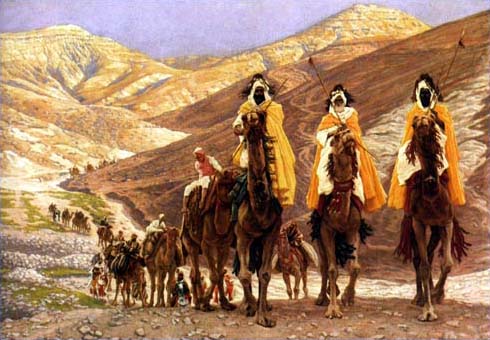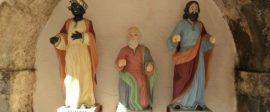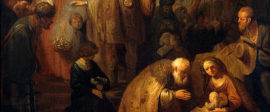Christmas Scriptures: Looking for God at Work: Matthew 2 and Luke 2 Sermon Notes
Sermon Notes / Produced by The High Calling
Overview:
Advent is a time of spiritual preparation, anticipation, looking for God’s coming into our experience as we consider the implications of the birth of Jesus for our own lives. We can be encouraged, invited, challenged to look for evidences of the presence of God in unusual, unexpected places, including our work. Typically, the season is full of distractions: shopping; social gatherings; extra worship events; tasks to get completed, at work as well as at home; or church.
Rather than add to the pressure of the season by adding more “religious” things to attend, invite the listener to simply pay attention for evidences of God in ordinary daily life, including work.
The Incarnation is a surprise. It is easy for the Christmas season to become routine. Perhaps God will surprise us with something new, fresh, unexpected in surprising places like “Bethlehem in Judah” or in our work, and indeed formative or transformative.
Two paintings triggered my thinking about searching for God in the context of work: Brenda Kingery’s painting entitled “The Seekers,"[1] and “The Journey of the Magi” by James Tissot (French, 894). (Kingery image is no longer available--Editors.) Both the Magi and the shepherds have encounters with God in the context of their ordinary work. Both respond to the reports of the birth of the King by searching for the infant. What do these encounters suggest, teach regarding the Incarnation, our daily work, and our relationship with God?
Biblical Texts: Matthew 2:1-12, esp. v. 1-2, and v. 8. The Magi are probably scholars, academics from Persia, whose work is astrology and the narratives of human history. Their arrival in Jerusalem looking for “the King of the Jews” suggests that in the course of their work they discovered something of divine significance. In v. 8, Herod gives an order to “search diligently.” Searching for God in one’s work can lead to fulfilling God’s purposes.
Luke 2:8-20, esp. v. 8, 15-16, Shepherds at work in the routines of their daily tasks have a dramatic, unexpected spiritual experience that compels them to also seek and find the child.
Big Idea: Focus: Two very different sets of workers, within the exercise of their ordinary work, are compelled to search for God. They find the Incarnate God, present in an unexpected, unusual, yet real place. So too, God is present and active in the places and content of our ordinary occupations. Advent can be an interesting time to search for God at and in work.
Introduction: Starting with the fact that Advent is here (or approaching), the sermon could begin with a review of familiar or traditional routines of the season. Typically there is considerable encouragement to make “this” advent special, different, more “spiritual.”
Often the serious Christian comes to the end of the Christmas Season disappointed, even guilty for not having “done more” or “done less” to “experience more.” This is a busy time of year, and often responsibilities of work increase with year-end tasks, expectations. “Seasonal” activities at work are added to the community and church activities of the season. The spiritual nature of the Christmas season is often in competition. Rather than feeling pressured with extra “religious activity,” this might be a welcomed opportunity to take the real-life expectations of work and train ourselves to look for evidences of God’s presence and purpose in and through the work.
A. The Shepherds
While we know little about these shepherds, their occupation is familiar, whether in Biblical times or today. (There are numerous Biblical references to shepherds—David the young sheep herder, Shepherd’s Psalm (23), Jesus as the Good Shepherd of John 10:7-18).
We know their work, physically demanding, common, and of low status. Yet it requires knowledge of land conditions, weather, behavior of sheep—and poachers, and wisdom in making critical decisions. The shepherds of Luke 2 apparently worked collaboratively.
For many of us, our work can be “ordinary,” routine, low status, physical, vulnerable to physical, environmental realities.
These Bethlehem shepherds were open to surprise, to the unusual. They paid attention to what they saw and heard. They responded to the vision, eager to seek and discover and return to their ordinary tasks—but with a transformative experience.
God met the shepherds in the fields outside Bethlehem, in the routine of their ordinary lives, occupations. So God may meet us in the ordinary routines of our daily work. (Note that the angel met Zechariah in the context of the ordinary routines of his work, the young Samuel in his work assisting Eli, or the risen Jesus encountering Saul on a business trip to Damascus. The unifying theme: the worker paid attention to the surprising evidence of God’s presence in their ordinary routines.)
B. The Magi
We do not know much about the Magi. They are probably astrologers from Persia who researched the connections between the movements of stars and historical expectations (ethnologists?) willing to travel to the outcomes their research suggested.
We do not know how long they had been involved in this particular research, nor do we know if they did their work together or independently. We do not know how many (the tradition of “We three kings” is attached to the three kinds of gifts). There are a number of legends about who they were, where they came from, and what they did after they returned “home.” But they did collaborate, travel together, and support each other in their search.
Their work was cerebral, involving observation, reflection, research, documentation. Our work may be essentially working with our minds more than our hands and feet. Our work, too, may require us to know an extensive amount of data that needs to be examined, analyzed, challenged. As we do, are we, like the magi, open to look for God’s activity, presence in surprising places? Are we willing to act on our developing awareness, searching for the place where God is present in our work or through our work?

In Tissot’s painting, one sees the magi intent on making the challenging journey through rough terrain, needing companionship and the support of others. It is not a solo journey—that would be foolish, even dangerous. (French, 1894)
Like the Magi, this may be a long, challenging journey, as suggested by T. S. Elliot in his poem, Journey of the Magi, “and so we continued. And arrived at evening, not a moment too soon. Finding the place; it was (you may say) satisfactory.”
C. Seeking/Searching for God in our Work
Whatever our work, there is more to explore, learn, discover. God is still at work in and through our work. God’s work continues as we fulfill the cultural mandate of Genesis 1 and 2 (to have dominion, fill, form, subdue, till, and steward what God has created). We are created in the image of God the creator and ruler to continue God’s work humbly, faithfully living into that image, fulfilling that calling. And we are to bear the image of the redeeming, reconciling Christ, “little Christs” (Luther) entrusted with the ministry of reconciliation ( 2 Cor. 5:17).
How does your work steward God’s intent in making the world? How does it till or enhance the basic resources God has made? How does it manage to bring order out of chaos, fulfill God’s purpose? How does your work repair the brokenness of society?
From the Shepherds and the Magi, we discover that:
1. God can meet us in the ordinary tasks and responsibilities of our work. We are to be open, pay attention.
2. God may surprise you—right where you are—at work.
3. Work is in context of team, community, collaboration, not solo discipleship.
4. Rejoice in the discovery, the evidence of God’s presence. Honor God with the gifts of your work as well as your words of praise.
Conclusion:
This Advent might provide the opportunity for a new, fresh way of preparing for Christmas, as seekers and searchers for the Incarnate Christ. In the midst of the searching for, seeking evidences, expressing evidences of God’s creative, recreating activity can bring a transforming experience of Advent and Christmas. And it can transform our understanding of and experience with our ordinary work.
As we search and pay attention to God in and through our work, we might be surprised with joy, even ecstasy Or we might find our joy in the midst of the hard stuff of our work, like the magi in T. S. Eliot’s Journey of the Magi:
A cold coming we had of it, just the worst time of the year, for a journey, and such a long journey.
And the cities hostile and the towns unfriendly
And the villages dirty and the charging high prices;
A hard time we had of it.
At the time we preferred to travel all night,
Sleeping in snatches
With voices singing in our ears saying
That this was all folly.
And so we continue
And arrived at evening, not a moment too soon,
finding the place; it was (you may say) satisfactory.
The manger, the Incarnation of the Word—made flesh, and we beheld His glory. Joy to the world the Lord has come!
*****************************************************************************************************
Dave Williamson is former director of Laity Lodge and on the steering committee of the Theology of Work Project.











